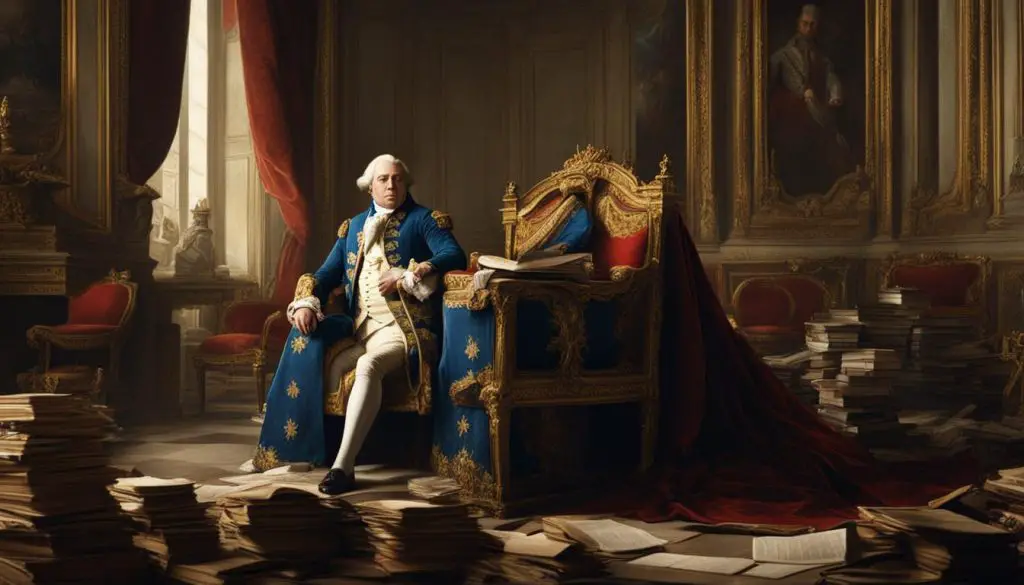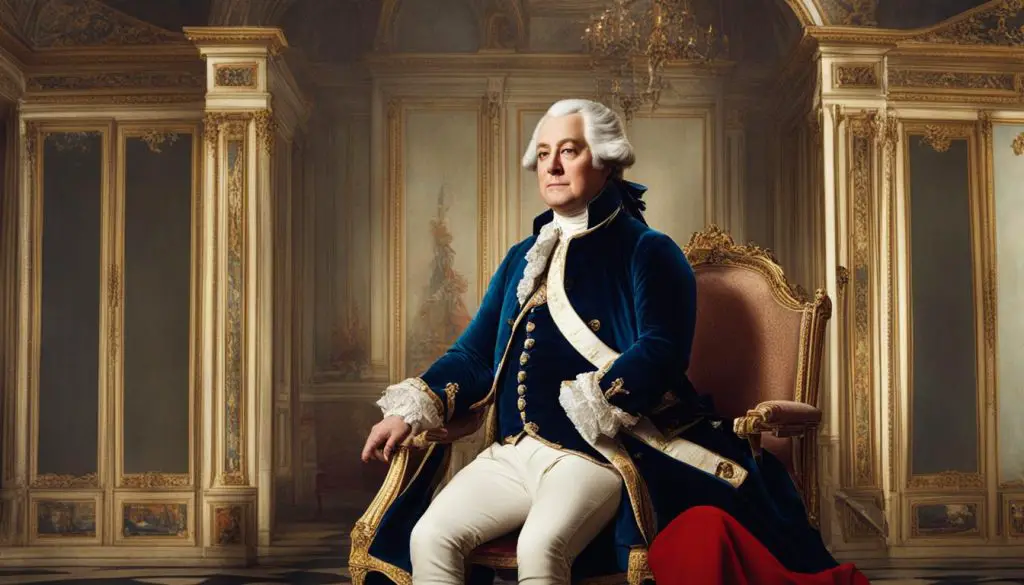Welcome to my blog, where I invite you to delve into the fascinating life and reign of King Louis XVI, the last king of France. From his early years to the dramatic events of the French Revolution, we will explore the untold story of this enigmatic monarch. Join me as we uncover the legacy and downfall of one of history’s most intriguing figures.
Key Takeaways:
- King Louis XVI was the last king of France before the monarchy was abolished during the French Revolution.
- His attempts at reform and struggles to navigate the crises of the 1780s ultimately led to the destruction of the monarchy and his execution.
- Louis XVI’s early life was shaped by a strict education and lack of social skills necessary for effective leadership.
- His marriage to Marie Antoinette faced challenges, and their infertility rumors strained their relationship.
- Louis XVI’s reign was marked by attempts at reform, financial troubles, and increasing discontent among the lower classes.
Early Life and Education of Louis XVI
In this section, we will delve into the early life and education of Louis XVI, shedding light on the formative years that shaped the last king of France. Born as Louis-Auguste de France in 1754, Louis XVI spent his childhood in the opulent Palace of Versailles. He was the son of Louis-Ferdinand, the dauphin of France, and his upbringing was entrusted to Duke de La Vauguyon.
Under the guidance of Duke de La Vauguyon, Louis XVI received a strict education that emphasized academic excellence and moral values. He excelled in his studies, with a particular aptitude for history, geography, and Latin. However, despite his academic prowess, Louis XVI struggled with social skills and displayed signs of indecisiveness, character traits that would influence his leadership style later in life.
“The education of a prince is of utmost importance, as it molds his character and prepares him for the responsibilities that lie ahead,” remarked Duke de La Vauguyon, reflecting on his role in shaping Louis XVI’s early life.
“I saw in Louis-Auguste a curious mind and a genuine desire to learn, but his introverted nature made it challenging for him to connect with others.”
| Early Life of Louis XVI Facts | |
|---|---|
| Date of Birth | August 23, 1754 |
| Place of Birth | Palace of Versailles, France |
| Education | Tutored by Duke de La Vauguyon |
| Significant Characteristics | Academically gifted, socially introverted, indecisive |
As Louis XVI transitioned from his childhood to his role as the dauphin, the foundation laid during his early years would set the stage for the challenges he would face as king. The Palace of Versailles, with its grandeur and history, served as both a playground and a classroom for the young prince, fostering a deep connection to the monarchy and the traditions it represented.
In the next section, we will explore the marriage and family life of Louis XVI, delving into the dynamics between the young prince and his future queen, Marie Antoinette, and the impact it had on his reign.
Marriage and Family Life of Louis XVI
During his reign, King Louis XVI formed a significant alliance through his marriage to Marie Antoinette, an Austrian archduchess. Their union took place in 1770 and faced initial challenges due to the young age of the couple and Louis XVI’s initial coldness towards his wife. However, over time, their relationship deepened, and they eventually had four children together.
Marie Antoinette gave birth to their first child, a daughter named Marie Thérèse Charlotte, in 1778. She was followed by three sons: Louis Joseph Xavier François, Louis Charles, and Louis Antoine. Unfortunately, their children’s lives were marked by tragedy and political unrest, as the French Revolution had a profound impact on the royal family.
The marriage between Louis XVI and Marie Antoinette was not without its challenges. Rumors and ridicule surrounding their infertility strained their relationship, and the public’s perception of Marie Antoinette as a foreign queen further fueled discontent. Despite the difficulties they faced, the couple remained devoted to one another and their children until the tragic end of their reign.
Family of Louis XVI and Marie Antoinette
| Child | Birth | Death |
|---|---|---|
| Marie Thérèse Charlotte | December 19, 1778 | October 19, 1851 |
| Louis Joseph Xavier François | October 22, 1781 | June 4, 1789 |
| Louis Charles | March 27, 1785 | June 8, 1795 |
| Louis Antoine | August 6, 1775 | June 2, 1844 |
Image source: seowriting.ai/32_6.png
King Louis XVI’s Reign and Attempts at Reform

During his reign, King Louis XVI of France faced numerous challenges and attempted various reforms in an effort to address the growing discontent among his subjects. However, his efforts were met with opposition from the French nobility and ultimately failed to quell the revolutionary fervor that was sweeping the nation.
The financial troubles of the French monarchy played a significant role in shaping Louis XVI’s reign. The country was burdened with a massive debt, largely due to extravagant spending by previous monarchs and the cost of wars. In an attempt to address this issue, Louis XVI implemented reforms aimed at reducing the financial burden on the lower classes and increasing taxes on the nobility. However, these measures were met with resistance from the French nobles who were unwilling to give up their privileges.
Nobility Opposition to Reforms
| Nobility Opposition | Consequences |
|---|---|
| The French nobility resisted Louis XVI’s attempts to reform the tax system and reduce their privileges. | This opposition further fueled the discontent among the lower classes and contributed to the outbreak of the French Revolution. |
| The nobility’s resistance to reform also undermined Louis XVI’s authority and weakened his ability to govern effectively. | As the revolutionary spirit grew stronger, Louis XVI found himself increasingly isolated and unable to win the support of his subjects. |
In addition to financial troubles, Louis XVI’s reign was also marked by the reign of terror, a period of intense violence and political repression during the French Revolution. The revolutionaries, led by figures such as Maximilien Robespierre, sought to eliminate any opposition to their vision of a new France. Louis XVI, as the symbol of the old regime, was a prime target for the revolutionaries and was eventually overthrown and executed by guillotine in 1793.
Despite his attempts at reform and his desire to address the grievances of the French people, Louis XVI’s reign ultimately ended in failure. His inability to navigate the challenges of the time, coupled with the resistance he faced from the nobility and the revolutionary fervor that swept the nation, sealed his fate and marked the end of the French monarchy.
Louis XVI and Marie Antoinette’s Role in the French Revolution
During the turbulent years of the French Revolution, Louis XVI and Marie Antoinette found themselves at the center of a rapidly changing political landscape. Their actions and perceived disregard for the needs of the people provoked resentment and ultimately led to their downfall.
One of the defining moments of the Revolution was the storming of the Bastille on July 14, 1789. This event marked the beginning of the Revolution and signaled the end of royal authority. The people’s anger was directed not only at the monarchy but also at the lavish lifestyle and perceived extravagance of Marie Antoinette. Her reputation as “Madame Deficit” fueled the flames of the revolution and further alienated the royal couple from the French people.
“Let them eat cake.”
The National Assembly, established in 1789, sought to address the grievances of the people and create a more equitable society. However, Louis XVI’s reluctance to support key revolutionary texts, such as the Declaration of the Rights of Man and of the Citizen, only deepened the divide between the monarchy and the revolutionaries. The growing calls for the abolition of the monarchy and the establishment of a republic intensified, leading to the dechristianization of France and the eventual execution of Louis XVI by guillotine in January 1793.
Despite their tragic end, the reign of Louis XVI and Marie Antoinette left an indelible mark on French history. Their role in the French Revolution serves as a reminder of the power of public opinion and the consequences of disconnecting from the needs and aspirations of the people. The monarchy was abolished, and the ideals of liberty, equality, and fraternity came to the forefront of French society, shaping the future of the nation.
| Key Events | Impact |
|---|---|
| Storming of the Bastille | Symbolic start of the French Revolution |
| Reluctance to support revolutionary texts | Deepened divide and fueled calls for the abolition of the monarchy |
| Execution of Louis XVI | End of the French monarchy and rise of republican ideals |
The French Revolution was a turning point in history, and the role of Louis XVI and Marie Antoinette cannot be overlooked. Their actions and the consequences they faced serve as a cautionary tale and a testament to the power of the people.
Louis XVI’s Interests and Influence

During his reign, King Louis XVI showed a strong interest in the applied sciences and technical curiosities. He was a patron of various scientific explorations and experiments, fostering advancements in fields such as chemistry, physics, and mechanics. Louis XVI even had special cabinets and laboratories installed near his private chambers at the Palace of Versailles, dedicated to these scientific pursuits.
One area that particularly captured Louis XVI’s curiosity was maritime exploration. He supported expeditions to discover new trade routes and expand maritime knowledge. Additionally, the king displayed a fascination with aeronautical experiments, encouraging the development of hot air balloons and hosting the first balloon flight at Versailles. These endeavors showcased his dedication to pushing the boundaries of scientific understanding during his reign.
“Science, my dear friends, is my true passion. I am delighted to support the brave men and women who dare to venture into uncharted territories, seeking knowledge and innovation. Together, we strive to unlock the secrets of the natural world and propel humanity forward.”
King Louis XVI’s interests and support for scientific advancements earned him the nickname “Louis the Last,” highlighting the unique blend of intellectual curiosity and regal influence he brought to the throne. His passion for the applied sciences left a lasting impact on the scientific community and inspired future generations to pursue innovation and exploration.
| Areas of Interest | Influence and Contributions |
|---|---|
| Applied Sciences | Sponsored research and experiments in fields such as chemistry, physics, and mechanics, leading to advancements in scientific understanding. |
| Maritime Exploration | Supported expeditions and encouraged the discovery of new trade routes, expanding maritime knowledge and fostering economic growth. |
| Aeronautical Experiments | Championed the development of hot air balloons and hosted the first balloon flight at Versailles, pushing the boundaries of aeronautical exploration. |
Legacy of Scientific Curiosity
Louis XVI’s unwavering dedication to the applied sciences left a profound legacy. His support for scientific exploration and experimentation contributed to the advancement of knowledge and technology, shaping the future of scientific inquiry. His interests in maritime exploration and aeronautical experiments set the stage for further discoveries in these fields, inspiring future endeavors such as Jules Verne’s captivating tales of adventure and exploration.
Moreover, Louis XVI’s commitment to scientific progress showcased the importance of intellectual curiosity and the pursuit of knowledge. His influence resonates to this day, reminding us of the significant role that monarchs and leaders can play in fostering scientific and technological advancements.
In the next section, we will delve into Louis XVI’s personality and leadership style, shedding light on the factors that ultimately contributed to his downfall and the end of the French monarchy.
King Louis XVI’s Personality and Leadership Style

King Louis XVI was known for his unique personality and leadership style, which played a significant role in the events that unfolded during his reign. His character traits and decision-making abilities shaped the course of French history and influenced public opinion.
The Indecisiveness of Louis XVI
One of the most prominent characteristics of Louis XVI was his indecisiveness. He often struggled to make firm decisions, particularly in times of crisis. This indecisiveness led to hesitation and delayed action, which further exacerbated the challenges facing the monarchy. Louis XVI’s inability to provide clear leadership and take decisive measures ultimately weakened his authority.
Leadership Style of Louis XVI
Louis XVI’s leadership style was characterized by a desire to gain the love and approval of his people. He sought to be seen as a benevolent ruler who cared for the welfare of his subjects. However, this desire for popularity led him to make compromises and concessions that undermined his effectiveness as a leader. Instead of making tough decisions based on what was necessary for the stability of the kingdom, he often prioritized short-term public opinion.
In order to win the love of his people, Louis XVI sacrificed his authority and the necessary strength to govern effectively. His focus on popularity rather than firm leadership had severe consequences for the monarchy and the stability of France.
Public Opinion and Perception
Public opinion of Louis XVI was deeply influenced by his personality and leadership style. His indecisiveness and perceived lack of resolve were seen as signs of weakness, making him an easy target for criticism and ridicule. The French people grew increasingly disillusioned with their king, viewing him as out of touch with their needs and concerns.
As public opinion turned against him, Louis XVI became a symbol of the monarchy’s failings and the oppressive regime that the revolution sought to overthrow. The perception of his character and leadership style played a significant role in fueling the revolutionary sentiment that eventually led to the downfall of the French monarchy.
Table: Characteristics of Louis XVI
| Characteristics | Description |
|---|---|
| Indecisiveness | Louis XVI struggled to make firm decisions, often hesitating and delaying action during times of crisis. |
| Desire for Popularity | He prioritized winning the love and approval of his people, often making compromises that undermined his effectiveness as a leader. |
| Lack of Resolve | Perceived as weak and lacking strong emotions, his leadership style was seen as sluggish and indecisive. |
| Disconnected from Public | His actions and decision-making were seen as out of touch with the needs and concerns of the French people. |
It is through the lens of Louis XVI’s personality and leadership style that we can understand the challenges he faced and the impact he had on the course of French history. His indecisiveness and desire for popularity ultimately undermined the monarchy and paved the way for the French Revolution.
The Legacy and Downfall of King Louis XVI

King Louis XVI’s reign came to an end with profound consequences for France and its monarchy. His legacy is intricately tied to the French Revolution, a tumultuous period in which the country underwent radical political and social transformation. The execution of Louis XVI by guillotine in 1793 marked the symbolic end of the French monarchy and set the stage for the emergence of republican ideals.
The impact of Louis XVI’s downfall was far-reaching. It signaled a definitive break from centuries of uninterrupted French monarchy and changed the course of French history. The execution of the king was seen as a powerful statement against the old regime and a catalyst for the revolutionary spirit that swept across the nation. The French Revolution would go on to reshape not only France but also the political landscape of Europe.
The execution of Louis XVI was a turning point that highlighted the power of the people and their ability to challenge established authority. It exposed the inherent flaws and inequalities of the monarchy, giving rise to demands for social and political change. The events that unfolded during the French Revolution and the subsequent abolition of the monarchy laid the groundwork for the establishment of a new era of governance.
As we reflect on the legacy of Louis XVI, it is impossible to ignore the profound impact of his execution and the end of the French monarchy. The events of his reign and the subsequent revolution have shaped not only the history of France but also the broader development of democratic ideals and the struggle for equality. The downfall of Louis XVI serves as a reminder of the power of the people and the potential for radical change in the face of oppressive systems of governance.
Conclusion
In summary, King Louis XVI’s reign was marked by challenges and political unrest, ultimately leading to the downfall of the French monarchy. Despite his attempts at reform, his indecisiveness and inability to connect with the people proved to be his undoing. The French Revolution and the execution of Louis XVI had a profound impact on French history, bringing an end to centuries of uninterrupted monarchy.
As the last king of France, Louis XVI’s legacy is one of revolution and the emergence of republican ideals. His reign symbolized the transition from an absolute monarchy to a more democratic system of governance. The execution of Louis XVI, the end of the Bourbon dynasty, and the destruction of the monarchy at the hands of the revolutionaries shaped the course of French history and laid the foundation for the modern French political landscape.
King Louis XVI’s story serves as a reminder of the consequences of ineffective leadership and the importance of understanding and responding to the needs of the people. His reign and downfall are a testament to the power of popular sentiment and the potential for radical change in times of political upheaval.
FAQ
Who was King Louis XVI?
King Louis XVI was the last king of France who reigned from 1774 to 1792 before the monarchy was abolished during the French Revolution.
What were the challenges faced during Louis XVI’s reign?
Louis XVI faced attempts at reform, financial troubles, and increasing discontent among the lower classes, which contributed to the outbreak of the French Revolution.
What led to the downfall of King Louis XVI?
Louis XVI’s indecisiveness, reluctance to support key revolutionary texts, and attempted escape in 1791 fueled resentment, leading to his arrest and the monarchy’s eventual abolition.
What was Louis XVI’s legacy?
Louis XVI’s reign marked the end of the French monarchy and his execution symbolized the end of a thousand years of uninterrupted French monarchy. His reign also had a profound impact on the development of republican ideals.
What were Louis XVI’s interests during his reign?
Louis XVI had a keen interest in the applied sciences and sponsored various explorations and experiments. He had special cabinets and laboratories dedicated to physics, mechanics, chemistry, and more.
How would you describe Louis XVI’s personality and leadership style?
Louis XVI was known for his indecisiveness and lack of social graces. He was often withdrawn and hesitant to reveal his true thoughts or opinions, which affected his decision-making and effectiveness as a ruler.
What was the impact of the French Revolution on Louis XVI?
The French Revolution led to the execution of Louis XVI and the abolition of the French monarchy. It had a profound impact on French history and the development of republican ideals.


























